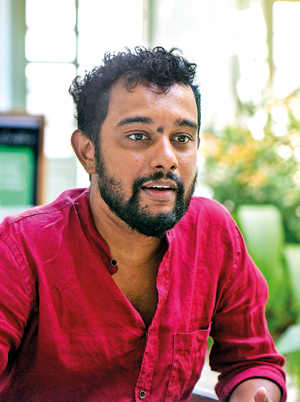Both local and tourist

Andrew Fidel Fernando: Capturing Lanka with uncanny flair. Pic by Sameera Weerasekera
At the beginning of this travelogue, Andrew mentions his grandmother of whom he says “The history she had been weaned on was warped”- meaning her firm loyalty to the British colonists. He speaks of a generation who grumbles that “This bloody country has gone downhill since the British left”.
His mother a Tamil Catholic – part of the Bharatha community- and his father, a Sinhala Buddhist, Andrew grew up in the village of Kirimetiyana, and when the family moved to Colombo when he was six, schooled at Lyceum International School before they migrated to New Zealand where he went on to graduate from Auckland University with a degree in history and theology. Now living in Dehiwela with New Zealander wife Erena and two-year-old son Sayuru- a name that reflects Andrew’s love of the sea, he continues to write cricket for a living- while also enjoying the pleasures of eating, cooking and scuba diving.
If it seems initially very much- a returnee’s book with a returnee’s amusement, from around the second chapter (if not earlier) you will plunge headfirst into this eight week adventure which captures the island with an uncanny flair.
Andrew is both ‘local and tourist’- childhood memories not effaced by having lived long in New Zealand. He has insight but is detached. He is also a shipshape satirist- his often limy, self-deprecating humour endearing him to the reader.
With a penchant for the past, he has a magpie’s flair to pick up the most tantalizing bits of history. He goes in search of the ‘torture tree’ of Paranagama in Uva where after the 1818 rebellion Sinhala villagers were lynched en masse by the British. This and the nearby sinister ‘Lekumbura’ (blood paddy field) illustrate the empire builders- red in sword and scabbard- amidst lush verdant upcountry villages.
He also has the deftness to coax out the soul and beauty of a place. Of Horton Plains he writes: “Laced exquisitely by mountain streams and specked by unhurried herds of sambar deer were the wheat coloured plains, a delicate curtain of mist already beginning to form on their fringes”.
Evoking a sense of place comes easily after years of cricket writing, says Andrew.
“The best sport writing I read always had this element where you are not just reading about cricket but also reading about the place through the lens of cricket.”
All he needed to do was wear a different lens- ‘a traveller’s lens or a historian’s’.
You meet a crazy host of dramatis personae between the covers: from the grandmother in the bus who insists on knowing why Andrew doesn’t have children; the East Asian man with whom he could have been cover boy for Gay Interracial Monthly; Shehan the ‘Disce Aut Discede’ boy, the British-bashing Cyril Jothipala and the ice cream seller who became an honorary archaeologist.
The book, as Shehan Karunatilaka says, is ‘a reminder to those who live here why we do’ apart from being a ‘wonderful introduction to visitors’- some essential Edenic beauty we had diluted with other stereotypical images swims to the surface.
The history and anthropology that embed the work like stained glass windows let the reader pass back and forth in time- for which Andrew says he is indebted to scholars such as K. M.de Silva, Nira Wickremesinghe, Michael Roberts, Lorna Dewaraja and Gananath Obeysekere.
As the saga proceeds, Andrew warms more and more to his country- in a steeply escalating line. While the politicians may be corrupt and the system a mess, his faith in the people – their humanity, generosity and warmth- cannot but glow amidst the hilarious absurdity the book has at its heart- like in the last scene at Sri Pada, when the sun comes out at dawn- and in the eager melee to watch the sight an observer says, “Aney pau – be nice. This must be these foreigners’ first sunrise. They probably don’t have it where they are from.”
It seems a golden moment with which to end. And, of course, to begin afresh…


